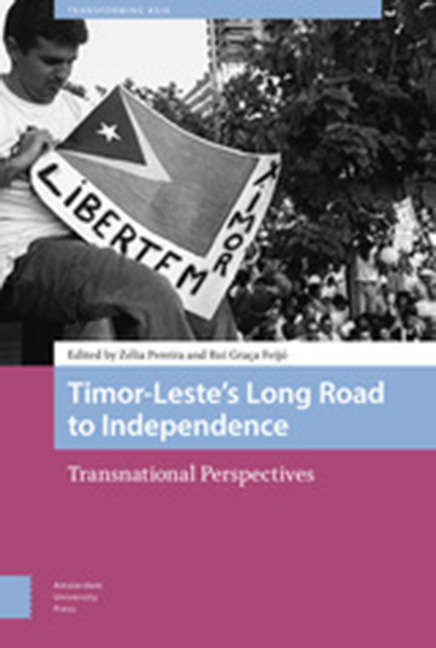Book contents
- Frontmatter
- Contents
- Acknowledgements
- A Note on the Name of the Country
- List of Figures
- Introduction: Timor-Leste’s Long Road to Independence: Outline for an Analytical Framework
- Part One Before The Portuguese Decolonisation
- Part Two The Portuguese Revolution Arrives In Timor-Leste
- Part Three Reaction To The Indonesian Invasion Of Timor-Leste
- Part Four Resisting The Indonesian Annexation Of Timor-Leste
- Index
5 - Looking for an “Honourable Political Solution”: The Comissão Nacional de Descolonização and the Fate of Timor-Leste, 1974–1976
Published online by Cambridge University Press: 14 February 2024
- Frontmatter
- Contents
- Acknowledgements
- A Note on the Name of the Country
- List of Figures
- Introduction: Timor-Leste’s Long Road to Independence: Outline for an Analytical Framework
- Part One Before The Portuguese Decolonisation
- Part Two The Portuguese Revolution Arrives In Timor-Leste
- Part Three Reaction To The Indonesian Invasion Of Timor-Leste
- Part Four Resisting The Indonesian Annexation Of Timor-Leste
- Index
Summary
Abstract
The National Decolonisation Commission was created in 1974 to define general lines of action and solve problems inherent to the process of decolonisation of the territories under Portugal's dependence. This chapter analyses its role in guiding Portuguese policy towards the fate of Timor-Leste between 1974 and 1976. It shows how the delay in defining a clear political line and the lack of harmony between the various entities involved hampered the necessary consensus for establishing a road map to the transition of power. It also highlights the fundamental role of the commission after the crisis of August 1975, as well as after the formal invasion of Timor-Leste by Indonesia, in the attempts made by the Portuguese authorities to obtain a solution to the decolonisation of Timor-Leste.
Keywords: National Decolonisation Commission, Portugal, Indonesia, Timorese political parties, self-determination
The Comissão Nacional de Descolonização/National Decolonisation Commission (CND), constituted under the dependence of the presidency of the Portuguese Republic in September 1974, had the purpose of defining the lines of action and directives of the decolonisation process. Its activity has not been studied as a whole, with occasional references being made toit, partly due to the dispersion of the documentation it produced and the informal nature with which, sometimes, its members acted, plus fluctuations in its composition depending on changes in government and other “revolutionary” bodies or on whom the president of the republic wished to convene.
During the period in which it functioned, until the summer of 1976, this body closely followed the development of the independences of the African territories and was confronted with the decolonisation of Timor-Leste, the object of this text. In order to understand the role of this commission in the fate of Timor-Leste, we will refer to the context of its creation and then show how it was slow to define a clear political line regarding the territory, responding hesitantly to pressures from Timor and Indonesia. After the August 1975 crisis in Timor and the departure of the Portuguese authorities from Dili to Atauro, the CND gradually took on a more interventionist role in conducting political, diplomatic and military decisions. After the Indonesian invasion, the Timor problem would almost exclusively be the one leading CND to meet several times in 1976.
- Type
- Chapter
- Information
- Timor-Leste's Long Road to IndependenceTransnational Perspectives, pp. 169 - 192Publisher: Amsterdam University PressPrint publication year: 2023

